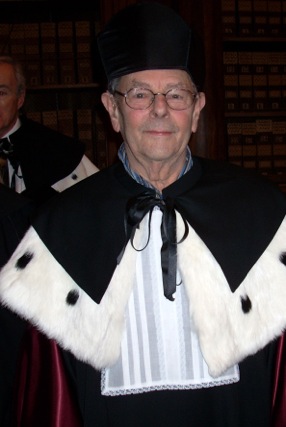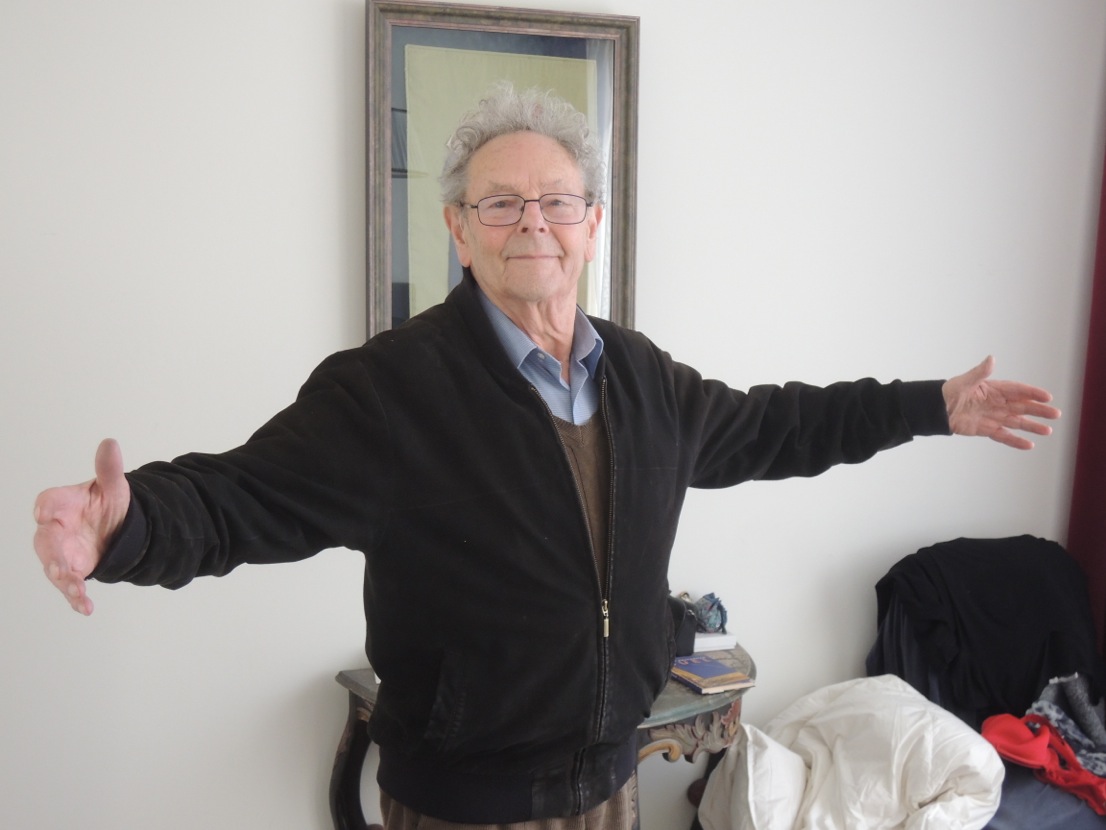
 Batja Mesquita, Department of Psychology, University of Leuven
Batja Mesquita, Department of Psychology, University of Leuven
Nico Frijda, one of the co-founders of the International Society for Research on Emotions, passed away after a heart attack on April 11, 2015. He is remembered as a principal driving force of modern research on emotions. Nico Frijda was a Professor of Psychology at the University of Amsterdam (1965 – 1992), a member of the Dutch Royal Academy of Sciences, and a member of the American Academy of Arts and Sciences. He is survived by his wife Roos, and four children: Merlijn, Michael, Miranda, and David, to whom he dedicated his books. Nico is missed by many friends and colleagues. I thank Keith Oatley for his feedback on an earlier version of this manuscript
Bold and Subtle
For over 35 years, Nico was my mentor and one of my best friends. He was a wonderful person, full of humor, compassion, and wisdom. His academic legacy is vast and impressive. It is impossible to do full justice to either the scientist or the person of Nico, but I will describe both with two adjectives that, combined, go a long way towards characterizing him: bold and subtle. These adjectives illustrate Nico’s uniqueness, complexity, and refinement.
Nico’s Ideas
From the very beginning of Nico’s career, as early as his dissertation in the 1950s, Nico’s model of emotions (published as Frijda, 1956), departed from the traditional view on emotions In this early model, Nico explained facial expressions as initial implementations of action readiness. Facial expressions do not correspond in a one-to-one fashion with emotions as we know them (anger, sadness, happiness, etc.), but rather with modes of action readiness. Nico proposed that these modes are beginnings of emotional engagements with the world. They include tensing the muscles in preparation to attack, opening the eyes in order to take in any information that might present itself, and so on. This explanation is more potent than the idea that facial expressions are linked to emotions as we know them, because it renders some patterns of confusion in emotion labeling understandable. Taking action readiness rather than emotions as the basic unit of analysis was a bold step.
Boldness and innovation characterize Nico’s other work as well. Nico’s 1986 book The Emotions expanded the idea that emotions are, at their core, engagements with the world. These engagements are functional, not just for the survival of the species, but functional to the individual’s needs and concerns. This book appeared at a time when the scientific community was receptive to the idea that emotions are purposeful, but Nico’s model was unique in several ways. First, Nico proposed that emotions are modes of action readiness; that is, they are first, and foremost, engagements with the world. Appraisals are orientations towards the type of engagement called for. In his last book The Laws of Emotion which appeared in 2007, Nico explains even more clearly that appraisals, too, are in the service of action. They are perceptions of situational affordances: What does this situation invite me to do? What are the situational terms of engagement? Second, Nico suggested that appraisal and action readiness constitute the emotional experience, rather than being the antecedents and consequences of emotion. I doubt that many understood the fundamental break Nico made with approaches that considered emotional feelings unanalyzable. In Nico’s view, emotions were to be analyzed in terms of the immediate functions they fulfilled in our relationships with the environment, most especially with the social environment.
Thus, Nico’s view that emotions are forms of action readiness, casts new light on the contents of experience, the role of appraisal, the origins of facial expression and the recognition thereof, and it is also consistent with the view that autonomic changes are to be understood as the physical preparation needed for action rather than emotional signatures.
In sum, Nico modeled emotions as forms of relationship between an individual and the environment, rather than merely as inner feelings accompanied by bodily changes. This was and is a provocative view that has been generative of research. Bold as this view may be, it does not easily fall on either side of the well-known controversies of the field. It is subtle. Yes, the affordances of the situations can be construed, but emotions are not social constructions. In fact, according to Nico –and here Nico and I disagreed—some of the most basic emotions are hardwired in the brain (Frijda & Parrott, 2011). The readiness to escape, attack, and freeze constitute the core of emotions, and they are hard-wired—Nico speaking. Then again, emotions are not acts, they are motivations to act: Motivations that we infer from the wide range of cognitive and instrumental acts that we observe in people who are emotional. Action readiness is real, but not to be found as a module in the brain that will light up once the skull is skillfully made transparent. More subtly, it is a functional reality, not a geographical reality; and of efforts to demonstrate the latter Nico has been critical. Bold is Nico’s functional view, but subtle is the fact that he does not equate functionality with an evolutionary derivation. Evolutionary explanations, in his view, are often “too easy,” and thus not subtle enough.
Nico as a Mentor
Among students at the University of Amsterdam, Nico had the reputation of being bold, not always in the fully positive sense of the word. Other students had warned me against “Professor Frijda”, who was known to be sharp and critical, not easy to please, occasionally authoritarian, though the most visionary of the professors. A man to be aware of and so, as student representative at the time, I was.
Very soon I came to know him as much more than the visionary, gruff person he was made out to be. Nico was the only professor who, ignoring protocol, called me “sweetheart” in the middle of a serious meeting (“I did not hear you, sweetheart, what did you say?”). Moreover, Nico unlike many of his colleagues could readily be challenged to explain his opinion or vision. And while it is true that he has always been more prepared to be right than wrong, he has also always been willing to admit being “less right,” and he has a sense of humor about it. He was subtle.
In the 15 years that Nico officially was my mentor, I benefited from the boldness as well as the subtlety. Nico had a strong presence, overwhelmingly so to a graduate student like me sometimes, but then he readily was able to take on another perspective (my perspective, that is). We disagreed, and I accused him of being abrasive and authoritarian indeed, but our disagreements tended to end in laughter and mutual understanding.
I also greatly benefited from Nico’s great insights on all kinds of theoretical challenges. The division of roles between us was pretty clear for many years: I generated problems, he found their solutions. For the longest time—much longer than any of my colleagues have experienced with their advisors— I found Nico’s solutions to be far better than any idea that I had heard or read. And even when I no longer agreed with all of Nico’s answers anymore, he remained one of the people with whom it was most intellectually stimulating, and most deliciously upsetting, to argue.
I remember asking Nico, about 25 years ago, who solved his puzzles, and if it was lonely at the top. He answered there were very famous people much smarter than him, and that being where he was gave him access to these people. I have yet to meet these famous people far smarter than him. Even after so many years, Nico remained one of the boldest, and yet most subtle intellects in the field.
Nico as My Friend
I learned more from Nico than the tricks of the trade alone. Nico was a great source of personal inspiration on life matters as well. And here too it is the combination of boldness and subtlety that describes him best. Of course, Nico was a great mind, a great friend, and so forth. Of course, many of his emotions and acts were based on well-conceived goals and aspirations for himself, his environment, science, and the world as a whole. But the greatness I admire most is his clear acceptance of responsibility for his own demeanor, his own emotions, and his own acts, even if they were less than perfect. I have been inspired by his acceptance that not all desire is noble, not all emotions are desirable, and not all acts are well conceived; they are what they are. And yet, he would say, there is no reason to resign, and all the more reason to take responsibility for them, if in the full recognition that one cannot fully control them. Bold and so damned subtle…
References
Frijda, N. H. (1956). Het begrijpen van gelaatsexpressies. (The understanding of facial expressions). Amsterdam: Van Oorschot.
Frijda, N. H. (1986). The emotions. Cambridge: Cambridge University press.
Frijda, N.H. (2007). The laws of emotion. Mahwah, NJ: Lawrence Erlbaum Associates.
Frijda, N. H., & Parrott, W. G. (2011). Basic emotions or ur-emotions? Emotion Review, 3(4), 406–415.




